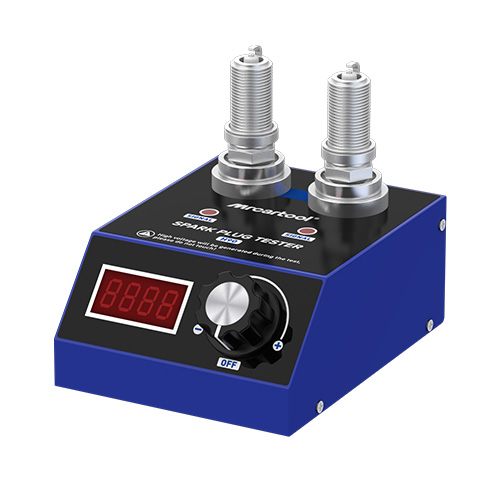
Is a spark plug tester really necessary?
- Daisy
- September 1, 2025

spark plug testerSpark plug tester covers a wide range of procedures, from checking whether individual spark plugs are functioning to conducting comprehensive system tests under load for the entire ignition system. In routine maintenance, some technicians complain that removing spark plugs is too cumbersome, opting instead to replace them all at once. Admittedly, from an operational standpoint, this approach is simple and effective. However, I believe a more precise and economical method is to identify faulty spark plugs and replace only those that are defective. This is especially true for expensive vehicle models, where targeted replacement can significantly reduce costs. Is this approach reasonable? Is there a way to use a tester to determine if a spark plug is damaged?
1. Uses and Limitations of Common “Spark Plug Testers”
- Inline spark tester: Simple in structure, functioning similarly to an extension cord with a bulb. Each ignition causes the light to flash, indicating spark generation. Essentially a high-voltage spark plug extension cord with an integrated bulb. The current flowing through the cord causes the bulb to illuminate, indicating whether the connected spark plug is producing sparks. Suitable for small equipment like lawn mowers. Inexpensive and easy to use, but cannot provide information on spark strength or timing.
- Adjustable-Gap Spark Tester: Incorporates an adjustable gap in the test lead to observe spark jump length. By adjusting the gap size, you can observe the maximum spark length the system can produce and the spark’s shape. However, it risks high-voltage backlash, eye damage from light exposure, and potential ignition system damage.
- Socket-Style Spark Plug Tester: Inserted into the spark plug for observation, it helps detect external spark leakage caused by insulator cracks. However, it also poses risks from ultraviolet radiation and ozone exposure, and provides limited diagnostic information.
- Spark kV Checker: Measures peak voltage on high-tension wires via probes. Effective for comparing cylinders in twin-cylinder engines, but unsuitable for modern coil-ignition systems and incapable of detecting intermittent misfires.
- Ignition Oscilloscope/Analyzer: Displays detailed ignition waveforms, favored by professional technicians. However, it is expensive, complex to set up, and has limited compatibility with modern vehicles.
2. Community Voices: What’s the Practical Perspective?
In the experience-sharing thread on Reddit’s Mechanics community (r/mechanic), we compiled insights from professionals regarding the modern spark plug tester. One veteran technician bluntly stated: “If you are a tech/mechanic who needs to diagnose and prove stuff, yeah, the tester is worth it…maybe (never needed one in my 10 years of wrenching). If you are just a home diy person, just change the spark plug. “This frequency-controlled tester is practically useless… If you suspect the spark plugs, just replace them. Another added, “It’s useless—a useless piece of junk”。Some technicians believe that charging for spark plug testing is less cost-effective than simply recommending customers replace them with new ones: “In my opinion, if your customer has issues that require you to change spark plugs, then just replace the darn things. The cost of a set of sparkplugs isn’t the end of the world in comparison to having a tech spend time putting a set of used spark plugs into a machine and test if they’re ok.” Some other customers believe spark plug testers are completely unnecessary: “This is a gimmick. Spark Plug Testers are better and cheaper methods of testing spark plugs. Will it tell you if the spark plug is working as it should? Yes. Will it tell you if your fuel, compression, ignition controls, etc., are good? No.”
In short, many technicians today prefer direct replacement over testing—testing tools are complex, less reliable than diagnostic scanners, or simply not user-friendly.
3. Lessons Learned in Our Workshop: Are Spark Plug Testers Truly Necessary?
In our workshop, we frequently inspect various vehicles and have observed that common automotive spark plugs tend to have relatively longer lifespans. These often utilize high-performance iridium or dual-iridium spark plugs, which command higher prices. Spark plug testers prove useful in the following scenarios:
1. When dealing with cost-sensitive, structurally simple machinery where spark plugs are expensive, use a tester to identify which cylinder is misfiring before deciding to replace just that one.
2. By quickly narrowing down ignition system issues, a spark plug tester can determine whether the problem lies in the ignition system itself or the spark plug.
4. Summary
“Identifying a single faulty plug and replacing only that one” is the fully informed and rational approach. While a tester isn’t a universal solution, it holds significant value in specific situations. Of course, if you possess more specialized ignition diagnostic tools, the tester can serve as a supplementary method.
1. When spark plugs are costly, precise testing saves more than blind replacement.
2. When the testing objective is clear—such as suspecting a single-cylinder fault—using a tester for confirmation before replacement is more efficient;
3. Testing yields significantly better results on engines with simpler configurations, like twin-cylinder units or small machinery.
In contrast, spark plug testers become less practical when dealing with modern coil-on-plug ignition systems or if you already possess an OBD-II scanner/professional ignition analysis tool.
Related blog: Ignore These Car Fluids and Filters and You’ll Pay for Expensive Repairs












































